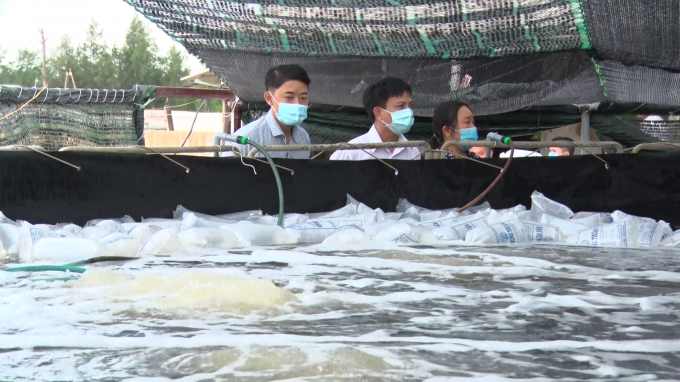November 27, 2025 | 19:34 GMT +7
November 27, 2025 | 19:34 GMT +7
Hotline: 0913.378.918
November 27, 2025 | 19:34 GMT +7
Hotline: 0913.378.918

Shrimp seeds are released within the white shrimp farming model on sand implemented by Quang Tri Agricultural Extension Center. Photo: PVT.
Quang Tri Agricultural Extension Center has supports local farmers with deploying the white leg shrimp farming model on sand to ensure food safety.
With the aim of transferring new farming techniques to farmers, Quang Tri Agricultural Extension Center has recently granted breeders to farmers and implemented the white leg shrimp farming model on the sand to ensure food safety.
The model is deployed on a total area of 2 ha, at 2 locations: Ha Tay village, Trieu An commune, Trieu Phong district and Nam Son village, Trung Giang commune, Gio Linh district (1 ha each).

The model is expected to spread people's awareness about shrimp farming to ensure food safety and disease. Photo: PVT.
The Provincial Agricultural Extension Center has supported and provided 80,000 12-post shrimp hatcheries at each farming site.
Applying the form of intensive shrimp farming in two stages, the first stage is the rearing process.
Shrimp seed are stocked in small-sized nursery ponds for easy monitoring of development, changes in weather, pond water sources, etc.
As a result, shrimps have become stronger, having improved resistance and higher survival rates.
Phase 2, after the shrimp are 30 days old, they will be moved to pond through the exhaust system and reared until the shrimp reach the commercial weight. During the rearing process, the farming household keeps a diary and a complete record of the implementation process to serve as a basis for traceability.
Processes to preserve food, chemicals, enhance biological products, use drugs and chemicals for farming must comply with regulations and ensure food safety.
The model not only opens up new effective farming directions but also contributes to raising people's awareness of sustainable aquaculture development.
Through the model, it will change the awareness for farmers about food safety, drug use, antibiotic residues and chemicals in aquaculture.
The application of the new process will create farmed shrimp that achieve food safety and hygiene standards, limit shrimp diseases, connect producers and businesses, improve economic efficiency and value of shrimp.
/2025/11/27/3830-1-152901_403.jpg)
(VAN) Dong Nai is developing its key crop areas, expanding planting area codes, and applying high technology to increase the value of agricultural products, aiming at a green and sustainable agriculture.

(VAN) Tay Ninh’s livestock sector is undergoing a major transformation, applying high-tech, closed-loop circular models to build sustainable value chains.
/2025/11/26/3627-4-082628_818.jpg)
(VAN) From a small café on the red basalt highlands, Le Van Hoang started a business with clean coffee, building Enjoi Coffee into a symbol of organic agriculture in the Lam Dong plateau.
/2025/11/25/0045-1-135246_13.jpg)
(VAN) Ca Mau is researching a model of sea-encroaching embankments combined with viaducts and logistics service zones, aiming both to prevent erosion and create land funds for marine economic development.

(VAN) The information was shared at the seminar 'Urban Agriculture - Solutions for Developing Green Spaces,' organized by the Kinh te & Do thi Newspaper and the Biotechnology Center of Ho Chi Minh City.
/2025/11/19/4141-2-132831_216.jpg)
(VAN) One of Japfa's outstanding solutions is implementing digital transformation and artificial intelligence (AI) to optimize operations, enhance productivity, and advance sustainable development.
/2025/11/19/4847-1-093540_448.jpg)
(VAN) The Gia Lai Provincial People’s Committee had a working session with the delegation of the U.S. Department of Agriculture, the State of Idaho, and representatives of the State's leading enterprises.